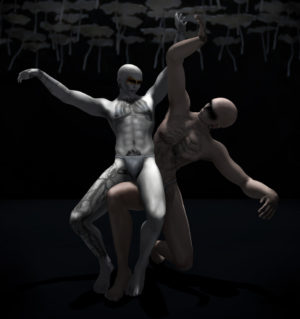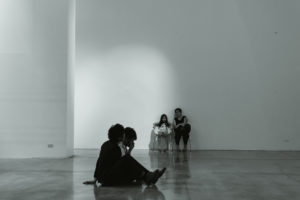Hollywood, MN
West of Frogtown where Saint Anthony Main meets I-94 on the Midway, there’s a boulevard where the famous people stand around all day and greet their fans. They smile and wave at all the cars pulling onto the highway. Sometimes the cars stop and give them money. My dad was the most famous of all of them, Captain Tony. Lots of the guys on the boulevard were preachers, but my dad was a sports fan. He was too thin for Minnesota, so he wore a Vikings sweatshirt under his Twins jacket and his face looked long and wind worn, except on gameday. That’s when he was happy. That’s when he’d turn red.
The Dinkytown college kids, the Seward hippies and Riverside hipsters, West Saint Paul yuppies and the Powderhorn Park lefties, they all knew him. You’d run into him around town and he’d hand you a sharpie and ask you to sign his bike, a three speed rust machine with no handlebars. He’d tell you what he knew like, “Indian is the rich man’s Chinese food,” and, “Pizza is in three different food groups.” Everybody was impressed.
I wasn’t famous yet, so my dad did what he could to keep me out of the public eye. He didn’t want my life to get wrecked by the paparazzi, the countless cars lining up on the ramp to 94 just to give a buck to their favorite celebrities. I’ll always love him for that. Not wanting to get me caught up in the fast life too young like all those other kids of Hollywood types.
I didn’t go to school because the other kids would’ve been jealous that I had a famous dad, so I spent most days at the park ten blocks up north of the boulevard, a big place, all full up with picnic benches, giant oak trees, tennis courts, and basketball hoops. The trees were old and hung over the park like a roof, so even in the middle of the afternoon it always looked like it was just before sunset. The echoes from the trucks engine braking on 94 made you feel far away, and it didn’t even smell like bus stops or bars like the Midway usually did—just summertime, wet and earthy. I’d hang out there with the other kids when they got home from the fifth grade. Their parents had normal jobs, working down at a school or making loans. I’d never heard of any of their dads, except Aaron Gilbert’s.
Sometimes we’d play normal tag, but we’d usually play Trash Tag. Trash Tag is that game where all the kids bring the plastic bags their gas station doughnuts and Mountain Dew summer flavors came in then go around the park digging through the waste baskets looking for whatever you can fling the best. Once everybody’s got a bag full up of really good stuff, like half full pop cans or bags of dog poop, you have to figure out who’s It. When you’re It in Trash Tag, everybody is trying to tag you and not the other way around. The dirtiest kid is It when the game starts. It was usually me, but sometimes it would be somebody else.
We’d play other games too, basketball, touch football, or Smear the Queer, depending on who was playing. Aaron Gilbert always picked the game. He was long and scrawny and looked like the noodles we’d get sometimes when the church on Charles and Fry threw spaghetti dinners, but he swore a lot and was mean and in junior high so we’d listen to him. Once he brought a computer printout to the park and made us all look at it. It was folded in the middle because he was hiding it in a book, but it was in color.
It was a picture of a girl, naked except for pink socks. She was kneeling on a bed with white sheets that had blue stars on them. It looked like she was stretching before bed, leaning back with her hands on her ankles and toothpaste on her lips. There was a flesh colored shadow on the inside of her hips. When I looked at it my ears started burning up and my lungs felt like they were going to fall out. Like I must have been doing something wrong, but wasn’t sure what yet.
I always felt that way with Aaron. His dad knew my dad, even though his dad wasn’t the same kind of famous. My dad said Mr. Gilbert was the kind of guy who would look down on you just for knowing twice as much as him. The kind of guy who thought being King Liquor actually made you somebody. Aaron was always telling lies about my dad. Saying he was a nobody and a drunk, like you could be that and famous at the same time. Saying he tried to steal from Gilbert’s Liquor, the store his dad ran up on Sherburne. I knew none of it was true. We had McDonald’s or Culver’s or Little Ceaser’s for dinner every night, not just on special occasions or after soccer games like the other kids talked about. It didn’t make sense to me that anybody could say we were too broke for anything.
A couple days after Aaron brought the picture, he told us he found a place with some more like it farther up the Midway. I wasn’t so sure about the first one, but there’s something about a thing like that that makes you want to feel that way again, burning inside and out and electric all through your neck, like you’re about to jump out of a tree or just snuck into the State Fair, but deeper than that. Something you don’t quite remember. Something that made you know you were alive without even having to think about it.
Aaron said the spot was up University, at an old closed down tire place. The other kids said some stuff about wanting to play basketball or having to get home in time for supper. I didn’t have anywhere to be, and my dad would probably be down at the boulevard for a couple more hours, so I told him I’d come with. He spit on the grass near me like he was pissed I was tagging along, but I think he was secretly glad to have somebody to go with.
By the time we got there, the sun was low and everything was golden. The sides of the building were all painted up with a mess of kids, all different colors and holding hands with a sign that said ‘Our Neighborhood’. It didn’t look much like our neighborhood to me, but we’d walked a ways since we left the park so I figured we must’ve hit Frogtown. I’d never been there before, but my dad talked about it sometimes. He said there were lots of Vietcong in Frogtown, which he didn’t like much. Sometimes he called it Ho Chi Minh City.
I asked Aaron if I was right and we should be on the lookout for Vietcong, and he asked me if I was born stupid or if I’d learned it from my dad. I would have said something back but I didn’t want to push my luck, not when we were just becoming friends anyway.
Around the back of the building there was a big wooden board instead of a door. The bottom half had rotted out and you could fit through the hole and get inside that way. Once we got in there it smelled like fresh sidewalk and dog pee. The air was thick and the floor was all full up with broken glass and flat old cigarette boxes turned gummy from mildew and concrete sweat.
There was a counter along the back wall, and Aaron whispered that the pictures were just behind it, magazines full of them. Glossy too, not like that paper shit he’d brought to the park. All kinds he said. Black girls and Asian girls, even fat girls. He said there was some fag stuff I’d probably like too, but I decided not to ask him what he meant.
There were a couple candles burned to hardly anything at all up in the corner next to a mess of blankets. A few odds and ends were laying around — a small plastic trumpet, some model airplane glue, a bike chain—and, right by the blankets, a pile of phonebooks and magazines. We crawled over and started leafing through them. Aaron was right. The magazines were smeared and warped from water so you could only make out about half of the pictures, but what you could make out was the kind of thing you knew nobody had ever seen before. Bodies pressing against each other and fitting together so many ways I forgot to breathe. I almost didn’t notice the foot. I must have seen it out of the corner of my eye, because I couldn’t hear anything except the blood in my ears. A foot in a beaten up work boot. A foot attached to a leg. A moving foot, attached to a leg, coming out from the pile of blankets. .
Aaron was looking through a magazine called Chocolate Mounds and didn’t have eyes for anything except what was right in front of him. I tapped him on the shoulder. He told me to fuck off. I told him about the foot. That’s when the Green Line Monster rose up. He had a greasy kind of mane on him and a big flannel shirt. Paul Bunyan from hell. Cigarette bone teeth, yellow and jagged and hollow in the middle so you could see inside of them when he opened his mouth to ask us what in the hell we thought we were doing. A voice like a blender full of rocks. Aaron dropped the magazine and we made tracks. A train was coming down University just then, and the signal from the light rail made me dizzy and drowned out everything as soon as we crawled out the rotten entrance we came in through. We couldn’t didn’t hear ourselves screaming until the train had passed us and we were halfway down the block.
The day my dad got kicked out of Gilbert’s Liquor once and for all, he took me to the McDonald’s out by the Spruce Tree Center, a monster of a building with walls that looked like they were made out of green bathroom tiles and a big old clock tower sticking out the top that was two times taller than anything else on the Midway. It wasn’t much to look at, but the clock tower was how I always found my way home, so it felt nice to be near it. He bought us a mess of cheeseburgers and fries and a couple of Filet O’ Fishes because, even though he figured that the food pyramid was probably a scam, there might be something to it. Besides, McDonald’s makes a pretty good fish. There was a bit of a to do about him getting charged extra for sauce packets, but eventually we got ourselves sat down and he started telling me what he knew.
He said to me son, it’s taxation without representation. It’s all about nickel and diming the little guy, you hear me? You think they charge Bill Clinton an extra thirty five cents for a packet of barbecue sauce? No son, there are two kinds of people in this world. The haves and the have nots, and not one bit of good comes from mixing between the two. You know why we celebrate the Fourth of July? No more taxation without representation. I heard you been hanging around with that Gilbert boy. All that sumbitch is trying to do is tax you son. I won’t have it, I won’t have the son of King Liquor poisoning my boy’s mind.
I didn’t have much to say to this because my dad never really had much of an inclination to listen to anybody else anyway, not unless they were giving him something new to know, so I just kept quiet and took a bite out of my cheeseburger. Now that I wasn’t supposed to be doing it, running around with Aaron felt even better. Like holding your breath until you can’t anymore, until you start to fade away then get dragged back sharp and sudden and clear and it’s right now, and you’re breathing. It’s right now and you’re breathing in and out.
The day we found the Haunted House the air was sweet with decaying leaves and you couldn’t see your breath yet, but you could feel it harsh down your throat. It was getting on towards Halloween and the dusk got longer as the days got shorter. Those evenings in the half light had a way of making you feel like an hour was plenty of time to do something that would change your life, you just had to find out what it was and get on with it quick, before the snow started sticking and the Cities got frozen solid.
Me and Aaron were walking along a set of railroad tracks out by Hamline trying to see what we could see, maybe a dead cat or a busted up printer or some girl’s underwear. Railroad track stuff. Everything was going along the way you might expect it to when we heard some glass breaking up through the treeline on the uphill side of the tracks. The embankment was covered in the ratty sort of forest you find stuck in the middle of the city sometimes between neighborhoods, like somebody forgot about it. I turned to look at Aaron, but he was already done looking at me and headed up towards the trees. I thought about not going up there with him, but staying on the tracks alone seemed scarier than going up into the woods together, so I ran after him.
The brush was already mostly dead from the pre-winter chill and you could feel it burn your skin when it scratched into your hands, waking up the numbness. The woods is always the loudest when it’s cold. Branches make high pitched zip sounds when they drag across your jacket and every step seems to shatter half the sticks in the forest, like you’re walking through a field of chicken bones. About 100 feet up the embankment we heard swearing and laughing and froze in our tracks, trying to stare our way through the brush. It was woven together on itself and full up with plastic bags and styrofoam cups and all kinds of other city things that would never rot away so there wasn’t much to see from where we were at.
We inched forward a few more yards. Up ahead the brush was crackling and shaking. Aaron knelt down and grabbed up an old chunk of cement from the dirt and flung it up ahead of us. A second later we heard a big thump like somebody stomped on a full milk carton, and then a shriek. Pretty soon the shriek turned into howling and more swearing and then we heard two more voices up ahead saying that they had to get Ben the hell out of there, that he was gonna need stitches if he didn’t stop bleeding right quick. We stayed frozen in the brush, neither one of us saying anything. Just breathing, in and out. Soon enough the shrieking and howling turned to whimpering, and then nothing. Aaron grabbed my shoulder and pulled me up and before I knew it he was dragging me through the brush towards where he’d thrown the cement.
We broke out into a clearing carpeted with empty bottles and old lawn chairs. There was a dead fire pit in the middle and another thirty or so feet back was the Haunted House. More a shack than a house really, left back in the woods from who knows how long ago and forgotten about. The windows had all been knocked out and the roof was a little crooked. It seemed like just what we’d been looking for. We’d both just about made up our minds to go over there and check the place out when we heard chicken bone cracks from across the clearing.
A hockey stick poked out of the bushes and there was a hand attached to it. Pretty soon the big fella behind it stumbled out into the clearing looking meaner than hell, and he wasn’t alone. A couple more guys, must have been three or four years older than us, trailed behind him, all geared up in hockey pads and carrying baseball bats and golf clubs and what have you. For a tick they just stood there looking at us, and we just stood there looking right back at them. About the same time we got to turning to run, the one with the hockey stick shouted that we must be the fuckers who threw that rock and they were after us.
We crashed on down the embankment getting whipped in the face and neck with stray branches, feeling the trees and bushes press against our coats, trying to pierce through but not quite making it, then cracking under our weight as we bowled forward. The shouting trailed behind us, but we could hardly hear it over the sound of the forest giving way. Once we got to the tracks we could still hear the other boys crashing down the hill behind us, so we kept on running.
By the time we hit a main road, about a mile up from the Midway, the back of my throat was thick with phlegm that tasted like blood. We were both coated in bits of wood and garbage and that cold fall sweat that sends a chill across your outsides to let you know where your insides are. We knelt down on the sidewalk to catch our breath and watched the rush hour traffic tear by. I looked at Aaron and he looked at me and there were streaks of all kinds of colors dancing around, like I’d been pressing my fists into my eyeballs. Just then, he started laughing. Not at me, but with me, at us. Like we were really in it together this time.
We only had one flashlight, so Aaron lit the way and I followed behind as close as I could. The air was cold and wet and the skeleton trees danced across the low flying Halloween clouds, undersides lit up by the Minneapolis skyline. At the top of the hill Aaron hissed and put out the light. I started to ask him what the big idea was, but he slapped me on the jaw so hard I could feel my teeth rattle and shushed me. He pointed at the Haunted House. There was a flickering light behind the broken windows. That’s when I heard it, an old swing set, rhythmic and shearing. There was groaning too. Somebody trying to wake up but not quite able to. We didn’t even have to look at each other to know that we had to see it, whatever it was.
Aaron led the way and we crept up to the Haunted House, crouched down low and moving slow. I couldn’t tell if we were getting closer or the sounds were getting louder, and then it didn’t matter because we were under the window, our backs pressed against the wall of the house. Vibrations came through the walls and our jackets and into our spines. My toes were cold. Aaron held up the flashlight and clicked it on.
We popped up to look into the window at the same time, Aaron dragging the flashlight across the window sill, clearing it of broken glass so we could lean in and have a look. And there it was. Money on a table and a candle in the corner. Six pack on the floor. My dad on his hands and knees on a rotten mattress with his pants around his ankles and another fella pressed up behind him. Bodies fitting together like a magazine. The look on my dad’s face when he saw mine, a look like I’d never seen even through all the Hollywood years. A look like an itch. Like it didn’t hurt yet, but he wanted it to.
**
Angus McLinn is a Brooklyn-based writer from the Upper Midwest who holds a MFA in fiction from LIU Brooklyn. He was a 2018 Pushcart Prize Nominee, and his award winning fiction has been anthologized in Writer’s Digest’s 17th Annual Short Short Fiction Competition Collection, Songs of my Selfie: An Anthology of Millennial Stories, and the 2013 Saint Paul Almanac. Other stories and poems of his have appeared in Blue Monday Review, Those That This, Tempered Magazine, Tiger Train Magazine, Marco Polo Arts Magazine, and elsewhere. He is the author of the fiction chapbook Your Heart Really Does Explode (Cloud City Press, 2012).
**
Image: Flickr / Thomas Hawk







